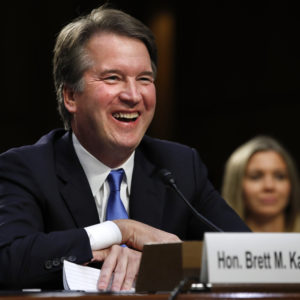When Sen. Mazie Hirono asked Supreme Court nominee Brett Kavanaugh about the Janus case in Washington, DC, she got the attention of Gov. Chris Sununu in Concord, NH.
In July, the Supreme Court ruled 5-4 that public-sector employees like Mark Janus, a state worker in Illinois, could not be forced to pay union-related fees. It was viewed as a huge win for the “right to work” cause, a cause that suffered a setback in New Hampshire when Sununu’s right-to-work legislation was defeated in the GOP-controlled House last year.
Hirono quoted an accusation from Justice Elana Kagan in her Janus dissent that the majority was “weaponizing the First Amendment,” and, Hirono claimed, “delivered a blow to millions of public sector workers.” Sen. Hirono then asked Kavanaugh whether he agreed with the Janus ruling. Kavanaugh declined to answer. “It’s a precedent of the court, but because it’s a recent case, I can’t comment,” the judge said.
However, it’s widely agreed that Kavanaugh’s history on the bench shows that he shares the expansive view of the First Amendment behind the Janus decision, and the principle that workers should not be coerced into funding union activity (much of it political) with which they do not agree. Liberal media outlets such as the New York Times and Think Progress have already declared Kavanaugh a pro-Janus judge.
So what does the Janus ruling—and the likelihood of a Supreme Court that will continue to uphold it—mean for the Sununu administration’s efforts on right-to-work legislation?
“Given the recent Janus vs AFSCME decision out of the United States Supreme Court, there is no need to pursue any additional legislation regarding right-to-work with the public sector,” Governor Sununu told NHJournal.
The Janus case flips the script on Republicans and Democrats when it comes to the Supreme Court and state law. Traditionally, Republicans have urged the Court to leave matters to state and local officials as much as possible. Democrats, on the other hand, have often supported the imposition of liberal policies on issues like abortion, same-sex marriage, environmental regulation, etc. onto states from on high. In this case, the Supreme Court decided that coercing union dues is a violation of a fundamental right—free speech—and therefore states shouldn’t have the right to allow the dues collecting to continue.
Janus upholds (as the Supreme Court ruled in the Harris v. Quinn case in 2014) “the bedrock principle that, except perhaps in the rarest of circumstances, no person … may be compelled to subsidize speech by a third party that he or she does not wish to support.”
Which means that if Gov. Sununu is re-elected (as polls indicate is more and more likely), he and the New Hampshire legislature will have to find other issues to battle over.
School choice, anyone?

